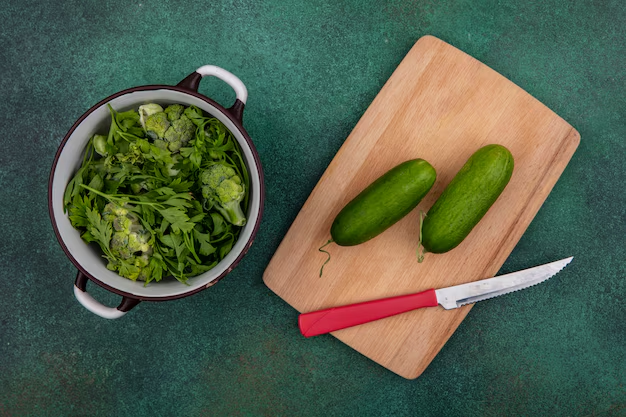Discover the Best Ways to Store Cucumbers for Maximum Freshness
When it comes to storing fruits and vegetables, one common question is whether cucumbers belong in the refrigerator or not. The way you store your cucumbers can significantly affect their taste, texture, and longevity. Let's explore this topic in detail, offering insights into the ideal storage methods and providing practical tips for keeping your cucumbers crisp and delicious.
🥒 Understanding the Nature of Cucumbers
Cucumbers are a beloved ingredient worldwide, often featured in salads, sandwiches, and refreshing summer dishes. To make the most of their refreshing crunch, it's essential to understand their characteristics. Cucumbers are over 95% water, which contributes to their hydro-crisp texture but also makes them highly susceptible to wilting and spoilage if not stored correctly.
Types of Cucumbers
There are several varieties of cucumbers, each with unique properties:
- Slicing Cucumbers: These are the most common, ideal for fresh consumption.
- Pickling Cucumbers: Typically smaller and bumpier, perfect for making pickles.
- English Cucumbers: Long and seedless, often used in condiment-rich recipes.
Each variety may respond differently to storage conditions, but general storage principles can apply to all.
🏠 Optimal Storage Conditions
Cucumbers belong to the gourd family, like pumpkins and melons, and require specific storage conditions to maintain freshness.
Temperature Considerations
Should Cucumbers Be Refrigerated?
While refrigerating seems like a natural choice to preserve freshness, cucumbers are sensitive to cold temperatures. Storage in the refrigerator can cause them to become watery and mushy over time due to the cold, dry air.
Best Storage Temperature: Store cucumbers at a slightly cool temperature, ideally between 50-55°F (10-13°C). A cool, dry corner of your kitchen or a pantry often provides a good environment.
Humidity Factors
Maintaining the right humidity level is critical:
- High Humidity: Cucumbers can become soggy.
- Low Humidity: They might dry out and lose crispness.
For those who decide to refrigerate, use the crisper drawer, which offers a slightly more humid environment.
Light and Air
Store cucumbers away from direct sunlight and in non-airtight containers to prevent spoiling.
🛠️ Practical Storage Methods
With these principles in mind, here are several practical ways to store cucumbers effectively:
Room Temperature Storage
Short-term: If planning to use cucumbers within 1-2 days, simply leave them on a countertop in a cool, dry area away from direct sunlight.
Refrigerator Storage Tips
If refrigeration is necessary:
- Wrap the Cucumbers: Consider wrapping in a clean paper towel followed by a plastic bag or a reusable cloth bag. This shields them from direct cold exposure while maintaining ideal moisture levels.
- Use the Crisper Drawer: The crisper drawer’s moderate humidity provides a gentler environment compared to the rest of the fridge.
Pickling for Preservation
Another time-tested method is pickling, offering an extended shelf life:
- Basic Brine: Vinegar, water, and salt can transform cucumbers into delicious pickles, capable of lasting several months when preserved correctly.
🌿 Factors Affecting Cucumber Shelf Life
Cucumber freshness depends on various factors that can influence their storage outcomes.
Freshness at Purchase
Select cucumbers that are firm to the touch, free from soft spots or wrinkles, and have vibrant color. Freshness at the point of purchase often dictates storage success.
Ripening Agents
Certain fruits like bananas, tomatoes, and apples emit ethylene gas, a ripening agent that can hasten the spoilage of cucumbers. Store them separately to extend freshness.
🔍 Summary of Key Storage Tips
Here's a quick summary of practical storage tips for cucumbers:
- Room Temperature: Short-term storage in a cool, dry place for 1-2 days.
- Refrigerator: If needed, use the crisper drawer, wrapping cucumbers in a paper towel or cloth bag to balance humidity.
- Pickling: A tasty, effective long-term preservation method.
- Away from Ethylene: Store separately from ethylene-producing fruits to prolong freshness.
By considering these factors and methods, you'll be prepared to store cucumbers in a way that maintains their delicious taste and texture. Whether consumed fresh or preserved, cucumbers can be a delightful part of your culinary routine with the proper storage techniques. Enjoy the benefits of crisp, refreshing cucumbers all year round with these simple, effective strategies!

